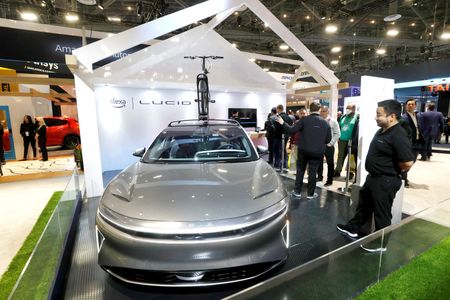 1
1 1
1
By Tiyashi Datta and Abhirup Roy
(Reuters) -EV makers Fisker Inc, Nikola Corp and Lucid Group disappointed investors with dull quarterly results and production target cuts, sending their shares lower on Tuesday and deepening worries about weak demand and an ongoing price war.
EV market leader Tesla Inc’s move to slash prices and increase volume, as well as lower-priced electric models launched by traditional automakers have hurt startups including Lucid.
Shares of SUV maker Fisker and truck maker Nikola Corp, which reported early on Tuesday, fell 7% and 13%, respectively. Shares of Lucid, which makes luxury sedans, dropped 6% on Tuesday after its results late on Monday.
Rivian Automotive Inc, however, beat Wall Street estimates for quarterly revenue on Tuesday as it sold more higher-priced electric vehicles and stood by its annual production forecast of 50,000 cars. Its shares rose 3% in after-hours trading.
Still, the downbeat updates from the other firms underscore the challenges facing cash-strapped EV firms, whose plans to disrupt the auto industry are unraveling in the face of rising interest rates and competition.
“Prototypes are easy, production is hard and achieving positive cash flow is excruciating,” Elon Musk, who took Tesla from “production hell” to the most valuable automaker, said on Twitter. Musk was responding to a tweet from Whole Mars Catalog, an EV blog, that calculated that Lucid lost $554,429.59 per car delivered in the first quarter.
The maker of Air luxury sedans made 2,314 vehicles in the period, burning through $835.7 million in cash. It now has $900 million in cash and cash equivalents and plans to produce more than 10,000 vehicles in 2023, compared with an earlier forecast of 10,000 to 14,000 units.
“Competition from a plethora of new electric crossover/SUV models coming to market should weigh on its top line,” CFRA analyst Garrett Nelson said, adding that he expected losses to balloon as Fisker ramps up production.
Fisker lowered its annual production target to between 32,000 and 36,000 vehicles from its earlier target of 42,400 cars, blaming supply-chain issues and an “updated timing” for roadworthiness certification.
The company, which started production of its Ocean SUV just in November and has $652.5 million in cash, also posted a larger-than-expected loss.
For Nikola, cash burn came in at $240 million as it produced 63 vehicles.
“This level of cash burn is not sustainable for our business, and we are looking at every option for reductions in spending,” Nikola finance chief Anastasiya Pasterick said.
In a separate release, Nikola said it was selling its stake in a joint venture with Iveco Group to the Italian truck maker for $35 million after Iveco said it would acquire full ownership of the JV.
(Reporting by Tiyashi Dutta in Bengaluru, Abhirup Roy in San Francisco and Caroline Valetkevitch in New YorkWriting by Sayantani GhoshEditing by Lance Tupper, Vinay Dwivedi and Matthew Lewis)